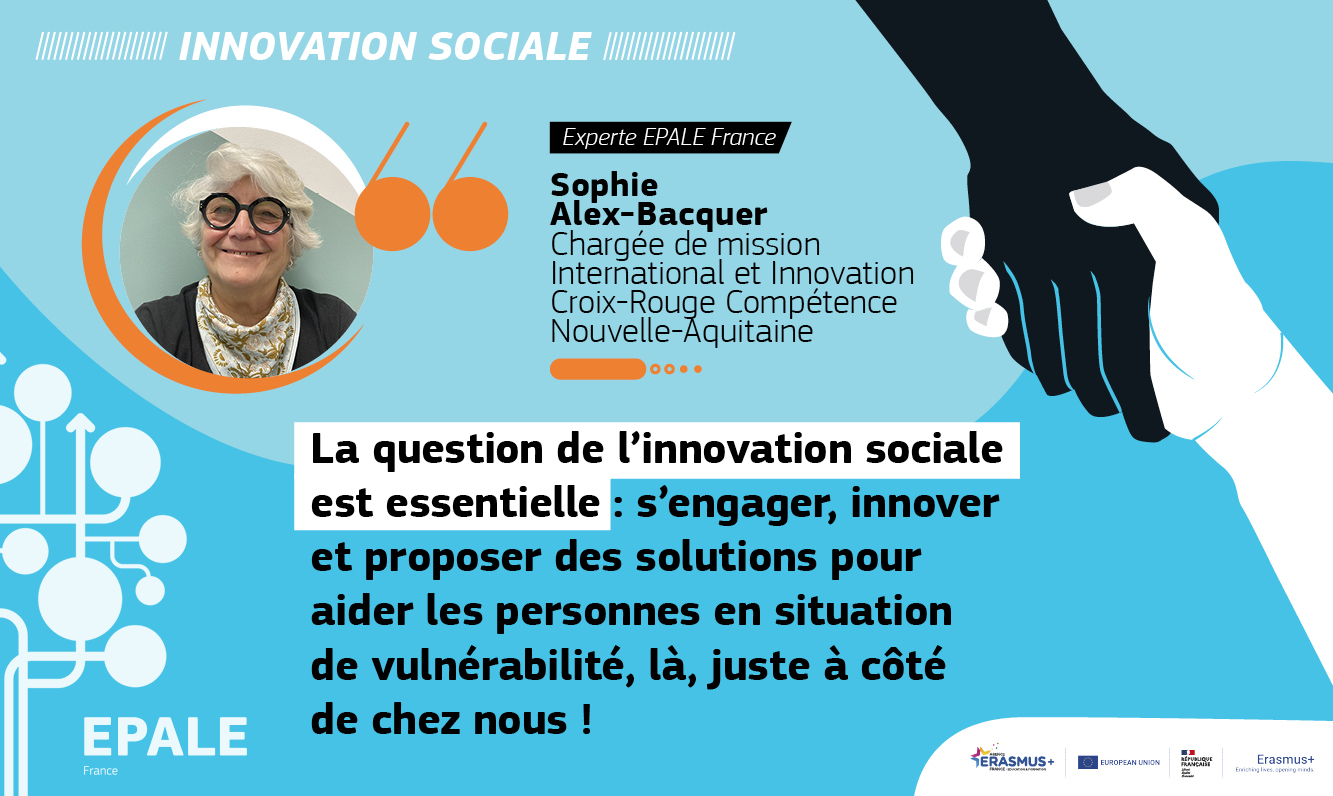Interview with Sophie Alex-Bacquer from Croix-Rouge Compétences Nouvelle-Aquitaine

EPALE France: How did your career path lead you to vocational training?
Sophie Alex-Bacquer: I began my career in the child welfare sector, then moved into the world of vocational training and integration before working in higher education, where I managed a group of visual communication schools for over twenty years. Then I joined the Red Cross (Croix-Rouge). This was at a time when the Red Cross training institutes had just obtained the Erasmus Charter (a document giving access to Erasmus+ funding for higher education), and I was very familiar with Erasmus+, given my previous experience of European mobility.
Quite quickly, the opportunity arose for us to respond to calls for proposals for cooperation projects and I was interested in setting up collaborations with other establishments in Europe, both public and private institutions. It’s very rewarding to come up with innovative solutions for a number of people, working with different European audiences. For the Red Cross training programme in Aquitaine, I responded to an initial call for projects in 2014. And around every year or two, I’ve continued to propose cooperation projects, very often in the field of adult education, because the issue of vulnerability has always affected me and I think this is a good way of addressing it.
EPALE France: What does the Red Cross training programme involve?
Sophie Alex-Bacquer: The training programme is known as Croix-Rouge Compétence. It is present in every region of France and provides training in all health and social professions through initial training, apprenticeships and continuing education. It is part of a lifelong learning approach, and also offers a whole range of vocational training courses for professionals working in the field, as well as courses on health and safety in the workplace.
We also offer a range of services for people who have lost their motivation to work, helping them to get back on their feet and join health and social care training programmes so that they can return to work. Across the Nouvelle-Aquitaine region, we welcome more than 6,000 learners a year, for all types of training.
EPALE France: Can you give an example of an Erasmus partnership that illustrates your work?
Sophie Alex-Bacquer: The partnership that meant the most to me came to an end two years ago; it was called “Change of View”. Its aim was to change the way we look at people in vulnerable situations, people who are looking for work or who have dropped out of school. These are all people we call “the invisible”, and they can have very different profiles, for example, people who have migrated, single women, or young people who have dropped out of school. We set it up with partners in Belgium, Luxembourg and Spain. We created innovative tools, such as a support game called “Talent Explorer”, to help highlight people’s talents and what we call their cross-disciplinary skills: using games is an interesting way of getting people to become aware of their skills. We also created a reference framework on empowerment, which is widely used by trainers to highlight people’s ability to take action and the resources they have within them.
We developed a support method that I have personally used, known as the “Clichés” method, which uses stories to help the people we support to become aware of moments when they have been able to implement or trigger their power to act. It has also become a podcast, now in its fourth season, that I produce with the Red Cross and Louie Media. The first season focused on the health crisis, the second on the war in Ukraine, the third on international humanitarian law, and the fourth season will be dedicated to local initiatives and the implementation of innovative proposals to support people in vulnerable situations.
EPALE France: What projects do you plan to develop with EPALE?
Sophie Alex-Bacquer: I want to raise awareness of the issue of social innovation, which is a major challenge: being more attentive to the needs of individuals and seeing how, with them and for them, we can find different and more appropriate solutions. In this respect, it is important to measure the impact of what we do, to see if what we do really does bring about a change in the lives of individuals, in the structures and for the people we support. The EPALE site is very interesting, it allows us to dig deeper into a subject, to be more relevant and, thanks to the blogs, we can highlight multiple examples on the same theme.
I started working with the platform at the beginning of February and I realise that every day I have a story to tell. It’s also an opportunity to showcase our partners. At the Red Cross, we have a social innovation accelerator, and the issue of social innovation for the resilience of people and territories is in our DNA.
[ Translate : EPALE NSS France ]





Komentaras
Quelle team !
Ravie de faire ta connaissance et de collaborer ensemble autour d'EPALE en 2024!
Bienvenue :)
Bienvenue aux nouvelles coordinatrices thématiques EPALE :))